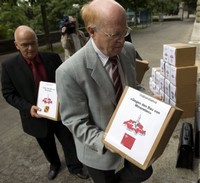UN Condemns Swiss Minaret Ban
The right-wing proposal for a ban, approved by more than 57 percent of voters in a referendum, was "discriminatory, deeply divisive and a thoroughly unfortunate step for Switzerland to take," Pillay said.

She warned that it "risks putting the country on a collision course with its international human rights obligations," because of its discrimination against a single religion.
"I hesitate to condemn a democratic vote," the High Commissioner for Human Rights said in a statement.
"But I have no hesitation at all in condemning the anti-foreigner scaremongering that has characterised political campaigns in a number of countries, including Switzerland, which helps produce results like this," AFP reports.
It was also reported, the Swiss government opposed the initiative but has sought to defend it as an action not against Islam or Muslims, but one aimed at improving integration and fighting extremism.
"These are extraordinary claims when the symbol of one religion is targeted," Pillay said in a statement. She said she was saddened to see xenophobic arguments gain such traction with Swiss voters despite their "long-standing support of fundamental human rights."
The referendum doesn't affect Switzerland's four existing minarets, or the ability of Muslims to practice their religion. It only bans the towers used to put out the Islamic call to prayer.
But wealthy Arab tourists might think twice now about spending their money in Geneva and other Swiss cities, and the neutral country's efforts to mediate in the Israeli-Palestinian conflict could also suffer, The Associated Press reports.
Meanwhile, Tuesday, Turkey, which aspires to become the first Muslim member of the European Union, said that the ban violates basic human rights and freedoms.
In a statement, the Turkish Foreign Ministry said that the Swiss vote had caused disappointment and was unfortunate.
The statement called on Switzerland to correct the decision, adding that more than 100,000 Turks living in Switzerland were worried.
Europe's top human-rights watchdog, the Council of Europe, has also criticized the ban, indicating that the heavily criticized vote could be overturned, Jerusalem Post reports.
Subscribe to Pravda.Ru Telegram channel, Facebook, RSS!


